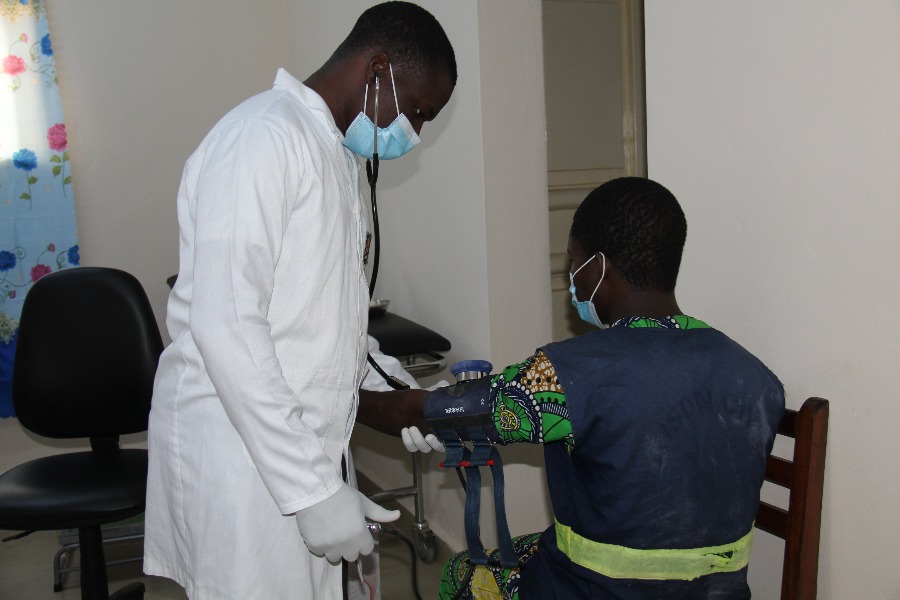Despite Government efforts, the prison occupancy rate in Benin is 170.19 per cent. This situation, which forces detainees to live in promiscuity and poor hygiene, constitutes a threat in the context of COVID-19. Accordingly, the United Nations Volunteers (UNV) programme, in partnership with the United Nations Development Programme (UNDP), has deployed 10 UN Volunteers (seven doctors and three psychologists) to improve health services in the prisons of Benin.
According to Mr Aouale Mohamed Abchir, the UNDP Resident Representative in Benin, the action of UN Volunteers in providing medical care and psychological support allows more than 10,300 detainees to exercise their right to health.
UN Volunteers are the first players in this project. Their work contributes directly to the good health and wellbeing of the prison population, reduces inequalities, and helps leave no one behind. --Aouale Mohamed Abchir, UNDP Resident Representative
Dr Gouda Faouzane, serving in the civil prison of Cotonou, actively contributes to fighting the pandemic. "We have succeeded in considerably reducing the spread of COVID-19. Since we started our assignment, the incidence of COVID-19 has gone from 15 contaminated cases to two cases today. All prisoners and staff are now practicing more hygiene rules and barrier measures against COVID-19," he says.
Besides, he initiated complete disinfection of the facilities with the Departmental Health Directorate team of the Littoral.
In the central part of the country, daily life is not easy for UN Volunteer Dr Edouard Kpahe, assigned to the civil prison of Abomey. He visits the dormitories every morning to detect any seriously ill prisoners. He carries out the daily medical examination and takes care of the administrative formalities in case of evacuation or specialized consultation. He also visits prisoners in the hospital once a week.
I am accountable for the health of more than 1,300 detainees and the proper functioning of the infirmary. The prisoners cannot change caregivers as they used to when they were free to move around. So, I do my best to serve them properly. This experience has made me more aware of my responsibilities. --UN Volunteer Dr Edouard Kpahe

UN Volunteer Dr Kpahe consulting a detainee of the Abomey prison. ©UNV, 2021
Some of the detainees have psychological or psychiatric histories and substance abuse habits; these often weaken their wellbeing in jail. UN Volunteer psychologist Emilienne Aligbonon helps the prisons of Cotonou and Abomey-Calavi to manage these cases. She provides psychological support through individual consultations, group therapy, sensitization and mediation.
For instance, Emilienne created small therapeutic groups on mental health and the consequences of drugs. She also works a lot on interpersonal relationships to prevent different forms of violence such as discrimination, verbal and physical violence, intimidation and segregation.
Volunteering is a new experience that I truly enjoy because of the values of inclusion and human integrity that are found in my daily work. This assignment is the realization of my desire to help vulnerable people. I am learning to work humbly and effectively with limited resources. --UN Volunteer psychologist Emilienne Aligbonon

UN Volunteer Dr Emilienne Aligbonon during an individual consultation with a detainee of the Abomey prison
Captain Sagbo Alladassi, Governor of the Abomey-Calavi prison stated, "We are grateful for the work of the UN Volunteers and their presence. We have seen many positive changes with the intervention of psychologist Emilienne. The most obvious example is that of the women detainees, who were experiencing a lot of conflict and fighting. Dr Aligbonon was able to identify and resolve the disagreements through some group therapy. She also conducted group therapy and individual interviews with inmate leaders on managing people in detention, which has proven to be very helpful."
Mr Abchir, UNDP Resident Representative, believes that the UN Volunteers impact the sustainability of the project in three ways:
- Firstly, the preventive health activities organized by the UN Volunteers are an asset that the detainees and the prison staff can sustain.
- Secondly, the doctors have trained the prison nurses and medical assistants, enabling them to be able to handle common illnesses.
- Finally, the counseling of psychologists helps in the remission of antisocial behavior and prevents recidivism, especially among young people and minors.
UNDP's support to the Ministry of Justice, through the project "Support to the Improvement of Access to Justice and Accountability," is part of an inclusive approach to leave no one behind in implementing the 2030 Agenda.
This article was also published by the United Nations Development Programme (UNDP): https://www.bj.undp.org/content/benin/fr/home/presscenter/articles/proteger-les-droits-des-detenus-au-benin.html

